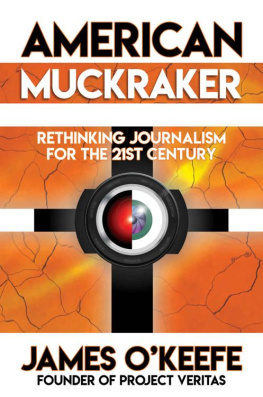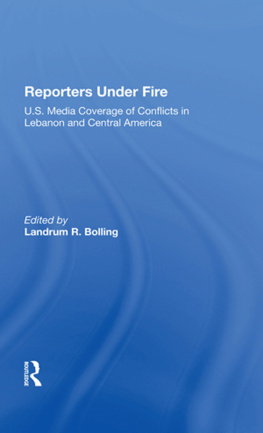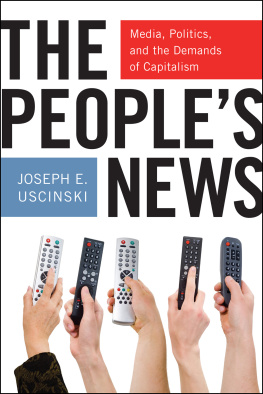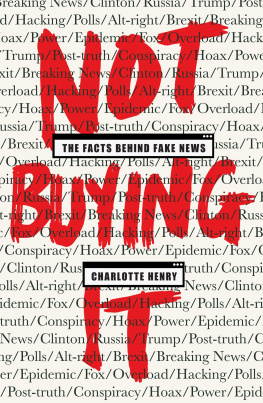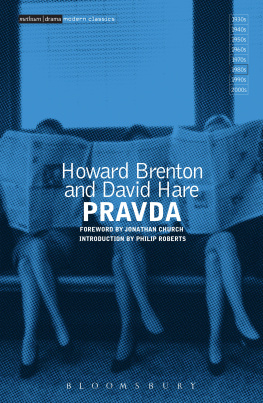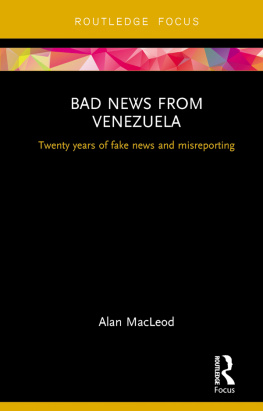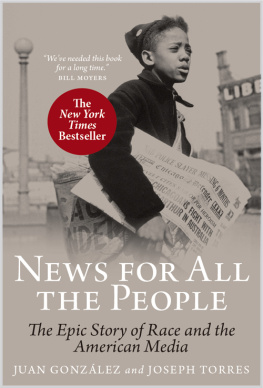American Pravda
My Fight for Truth in the Era of Fake News
James OKeefe
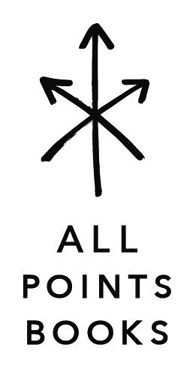
Thank you for buying this St. Martins Press ebook.
To receive special offers, bonus content, and info on new releases and other great reads, sign up for our newsletters.
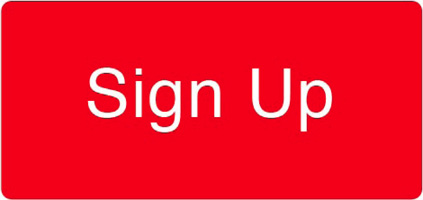
Or visit us online at us.macmillan.com/newslettersignup
For email updates on the author, click here.
The author and publisher have provided this e-book to you for your personal use only. You may not make this e-book publicly available in any way. Copyright infringement is against the law. If you believe the copy of this e-book you are reading infringes on the authors copyright, please notify the publisher at: us.macmillanusa.com/piracy .
Dedicated to the memory of James E. OKeefe Sr.
who built things out of nothing,
who was told,
it cant be done,
but who did it anyway.
And Jeffrey Wigand, whos out on a limb, does he go on television and tell the truth? Yes. Is it newsworthy? Yes. Are we going to air it? Of course not. Why? Because hes not telling the truth? No. Because he is telling the truth. Thats why were not going to air it. And the more truth he tells, the worse it gets.
Al Pacino as 60 Minutes producerLowell Bergman in The Insider, 1999
The press has become the greatest power within the Western countries, more powerful than the legislative power, the executive, and the judiciary. And one would then like to ask: by what law has it been elected and to whom is it responsible?
Aleksandr Solzhenitsyn, Harvard commencement address, 1978
Mr. Trump will see you now, said a secretary, one of several moving around the outer office, each better looking than the last. I was ushered in. The view of Central Park beyond was pretty overwhelming, especially for an everyday guy like me from New Jersey. Trump smiled and stood to greet me.
That pimp and hooker thing you did, wow! said Trump. That was incredible. He turned to Sam Nunberg, the Republican consultant who arranged the meeting, They shut down ACORN! I was flattered that he took our work seriously, but he did not agree to this meeting to sing my praises. He was a man with a plan. In 2011, Trump generated a lot of publicityor, what they call in the business, earned mediawhen he challenged President Obamas birth certificate. Although virtually all of the press was negative, Trump positioned himself in the public eye as the presidents equal, someone Obama had to take seriously. When I saw this play out, I could see in Trump a kindred spirit, someone who understood the media establishment and knew how to play it against itself. In 2012, Trump flirted with a presidential run but did not pursue it.
In 2013, Obama still interested him. From what I gathered that day, Trump was not a birther, never was. He was confident Obama was born in the United States, but he suspected Obama had presented himself as a foreign student on application materials to ease his way into New Yorks Columbia University, maybe even Harvard too, and perhaps picked up a few scholarships along the way. Trump had reason to believe Obama was capable of this kind of mischief. In May 2012, Breitbart News unearthed a promotional booklet produced in 1991 by Obamas literary agency at the time, Acton & Dystel. In the booklet, Obama claimed to have been born in Kenya and raised in Indonesia and Hawaii.
This was nothing more than a fact checking error by mean agency assistant at the time, said agent Miriam Goderich in response. There was never any information given to us by Obama in any of his correspondence or other communications suggesting in any way that he was born in Kenya and not Hawaii. Indeed, Goderich admitted to writing the sentence about Kenya but never stated where she got the idea in the first place. Beyond Americas newsrooms, people doubted Goderichs explanation, but those newsrooms aborted the story in the womb. They did that often. In 2013, Obamas Columbia records remained sealed. Trump was hoping my colleagues and I might take an interest in finding out what mysteries those records held.
Nobody else can get this information. Do you think you could get inside Columbia? As I explained, that was not exactly our line of work. We were journalists, not private eyes. But Trump does not give up easily. For at least half an hour, even though there were others in the room more importantCitizens Uniteds David Bossie among themhe spoke to me as if Project Veritas were the only thing in the world worth talking about. I have heard the same said of Bill Clinton, but I can vouch for Trumps charisma.
Trump has a thing for magazine covers. Framed covers lined the office walls, and stacks of magazines with his image on them piled up on his desk. Yes, this was a man who knew a thing or two about earned media. Trump would ride that media, good and bad, as far as it could take him, earning by some estimates as much as $5 billion in free publicity during the election. His advisors told him he could not win on earned media, and he proved them wrong. Media is everything, Andrew Breitbart often reminded me, and Trump would prove him right.
At the end of our discussion, Trump shook my hand, encouraged me to keep up the good work, and half-whispered, Do Columbia. He then posed for a photo with me in front of a framed copy of a Playboy magazine from 1990. I had earlier shown him a Playboy from 2011 in which my name was mentioned on the cover: The Dirty Tricks of James OKeefe. Trump one-upped me. As he told me, he was the rare guy whose picture had been on the cover. It was that cover we posed in front of.
Trump had Keith Schiller, a tall, tough-looking guy with close-cropped white hair, escort me out. A former NYPD detective and Trumps security director at the time, Schiller would follow Trump to the White House. It was Schiller who got the nod to go to LA and fire FBI honcho James Comey. If you met Schiller, you would understand why Trump sent him. He is pure, understated Alpha. Picture the character Mike in Breaking Bad. His instruction this time was to take me to the Trump store and give me however many ties I wanted to take away. Ties were apparently the currency of the realm. On leaving Trump Tower with my booty of ties, it never crossed my mind that one day Trump would be president. I did think, however, he could make one hell of an ally.
As the events of 2016 proved, Trump and I had something fundamental in common, not so much a shared ideology as a shared adversary. At Project Veritas, we take no real position on issues beyond free speech and honest government, and in 2016, let alone in 2013, who even knew what Trumps ideology was. Historian Victor Davis Hanson accurately describes President Trump as a reflection of, not a catalyst for, the widespread anti-statist, anti-globalist resentment that got him elected. The adversary we shared was a powerful one, what might well be called the deep statemedia complex. Although the media could exist without the deep state, the deep state could not exist without the media. By exposing the waste, fraud, and abuse of the administrative state, we inevitably disrupt the medias relationship with government and organizations that work with government. Like Trump, Project Veritas is a disruptor. If we have an ideology, it is less conservative than anti-statist, antistatus quo.
In their 1988 book Manufacturing Consent, Edward Herman and Noam Chomsky anticipated a showdown like the one that played out in the campaign of 2016. By 1988, the dominant mass-media outlets were all large, powerful corporations. Although restricted in some ways by their own ideological blinders, the authors made some useful observations, accurately describing the establishment media as effective and powerful ideological institutions that carry out a system-supportive propaganda function, by reliance on market forces, internalized assumptions, and self-censorship and without overt coercion. If Chomsky and Herman erred, it was in thinking that the deep state would inevitably skew right. It has not.


